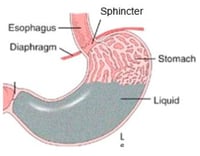Gastroesophageal (GE) Reflux in Children
Jump to:
What is gastroesophageal reflux?
Reflux is a term used when stomach contents flow back up into the tube that connects the mouth to the stomach. This tube is called the esophagus. Reflux can irritate the esophagus. It may also cause problems with swallowing or breathing.
What causes it?
- There is a small muscle at the end of the esophagus called the sphincter.
- When your child swallows, the muscle relaxes to let food or fluids go into the stomach. The muscle should tighten to keep the food and fluid in the stomach. (Fig. 1)
- With reflux, the muscle relaxes when the stomach is full. Some of the food and fluid may flow back into the esophagus. (Fig. 2)
- This often happens when your child eats too fast or eats too much at any meal.
How does GE reflux affect my child?
A child with GE reflux may:
- Have pain or a burning feeling behind the breastbone.
- The pain or burning feeling may feel like it moves up the breastbone toward the neck.
- This pain is due to irritation of the esophagus by stomach acid.
- Burp and complain about a bitter taste in the mouth.
- Throw up (vomit).
- Say that it hurts to swallow.
- Cough.
- Have problems with asthma symptoms or hoarseness.
Tips to help your child
- Have your child eat smaller meals more often.
- Only give your child water to drink within 2 to 3 hours before bedtime. Do not let your child eat or drink anything else.
- Decrease food and drinks known to increase the pain. This includes fatty or spicy foods like bologna, hot dogs, salami; foods that are deep fried (fast food); citrus products and tomato products. Caffeine found in teas, chocolate and soda might also cause some pain.
- Do not give large meals before exercise.
- Alcohol and tobacco in any form can cause an increase in pain. Alcohol is in many medicines for children. Do not let anyone smoke in your home, car or other areas where your child spends time.
- Remind your child to eat slowly and chew food carefully.
- Children who are overweight tend to have GE reflux more often. Talk to your child’s doctor, nurse or dietitian about ways to help your child lose weight, if needed.






